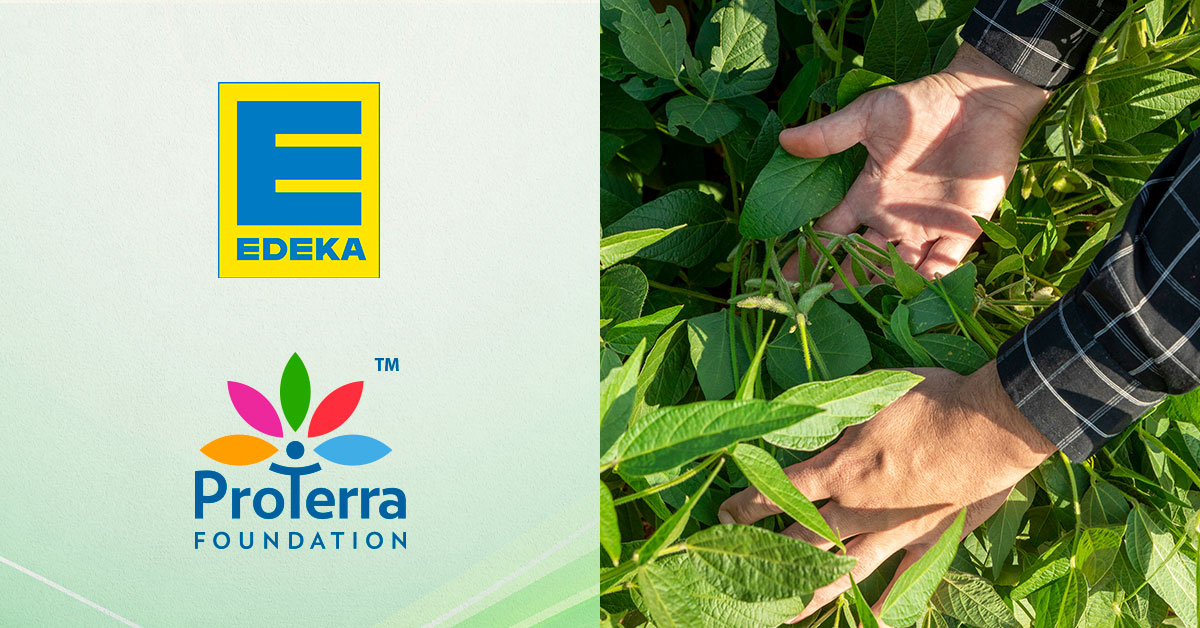EDEKA – ProTerra joint project to increase deforestation-free Brazilian soy

Scroll down for German version
Food companies and retailers having agricultural commodities and ingredients in their products have a responsibility to take the lead in mitigation the risk of social and environmental contradictions to their sourcing policies.
Deforestation, soy feed cultivation and the associated consequences are currently among the most pressing environmental issues. To promote change, the ProTerra Foundation and EDEKA, one of the leading German food retailers, have started a joint project. The goal is to increase the volumes and availability of sustainable, deforestation-free Brazilian soy in the EU.
Europe is a pioneer when it comes to soy and therefore plays a key role in establishing deforestation-free, sustainable soy products and setting an example.
ProTerra Foundation has developed an MRV, Monitoring, Reporting and Verification system, that aims to decrease and mitigate the risk of importing raw materials that may be connected to deforestation or social corporate responsibility.
In order to establish a long-term goal commitment, it is necessary to introduce positive change in the supply base on farm-level. Elements of supplier management and control systems must include -risk assessment and supply chain mapping, and a procedure for identifying and addressing non-compliance. It must also address activities related to responsible land acquisition and development practices, including impact assessments and the use of Free Prior Informed Consent (FPIC) when appropriate.
The aim of the new project is therefore to strengthen the supply base and thus a corresponding offer. For producers in Brazil, this means that areas with indigenous vegetation cannot be cleared, converted into agricultural land or used for industrial (or other commercial) purposes after August 2020. This is ensured by an annual check. This has no influence on the cut-off date 2008 for the already ProTerra-certified companies. Control measures such as monitoring will be done by third parties.
Building on the MRV project described above, ProTerra’s proposition is to widen the scope of the project and include farmers that have not been certified or verified under any standard and do commit to the cut-off date of 2020, in the scope of the support by EDEKA.
International cooperation is essential to achieve positive impact on the ground. This is a historical step that has been achieved as a result of an agreement between EDEKA, ProTerra Foundation and Brazilian crushers supplying Europe with land conversion-free products.
Lebensmittelunternehmen und Einzelhändler, die landwirtschaftliche Rohstoffe und Zutaten in ihren Produkten verwenden, tragen die Verantwortung, soziale und ökologische Risiken zu mindern.
Entwaldung, Sojafuttermittelanbau und die damit verbundenen Folgen gehören aktuell zu den drängendsten Umweltthemen. Vor diesem Hintergrund haben die ProTerra Foundation und der EDEKA-Verbund, einer der führenden deutschen Lebensmitteleinzelhändler, ein gemeinsames Projekt gestartet. Ziel dieser Zusammenarbeit ist, eine positive Veränderung der Versorgungsbasis in der EU zu erreichen und die Mengen und Verfügbarkeit von nachhaltigem, entwaldungsfreien brasilianischen Soja in der EU zu erhöhen.
Europa ist beim Thema Soja ein Vorreiter und hat daher eine Schlüsselfunktion, um entwaldungsfreie, nachhaltige Sojaprodukte zu etablieren und beispielhaft voranzugehen.
Die ProTerra Foundation entwickelt ein MRV-System (Monitoring- und Verifikationssystem), mit dem das Risiko des Imports von Rohstoffen, die mit der Entwaldung verbunden sein können, verringert werden soll.
Zu den Elementen des Lieferantenmanagement- und Kontrollsystems müssen die Risikobewertung und die Zuordnung der Lieferkette sowie ein Verfahren zur Feststellung und Behebung von Verstößen gehören. Sie muss auch mit Aktivitäten im Zusammenhang mit verantwortungsvollen Landerwerbs- und Entwicklungspraktiken ergänzt werden. Ziel des neuen Projekts ist daher, die Versorgungsbasis und damit ein entsprechendes Angebot zu stärken. Für die Erzeuger in Brasilien bedeutet dies, dass Gebiete mit einheimischer Vegetation[1] nach August 2020 nicht gerodet, in landwirtschaftliche Flächen umgewandelt oder für industrielle (oder andere kommerzielle) Zwecke genutzt werden können. Dies wird durch eine jährliche Überrpüfung sichergestellt. Dies hat keinen Einfluss auf den Stichtag (Cut-Off Date) 2008 für die bereits ProTerra-zertifizierten Betriebe. Kontrollmaßnahmen wie Monitoring wird durch Dritte gewährleistet.
Basierend auf dem oben beschriebenen MRV-Projekt strebt ProTerra an, den Umfang des Projekts zu erweitern und Landwirte, die vorher nach keinem Standard zertifiziert oder verifiziert wurden und sich zum Stichtag 2020 verpflichten, in den Rahmen der Unterstützung durch EDEKA einzubeziehen.
Internationale Zusammenarbeit ist von entscheidender Bedeutung, um positive Wirkung vor Ort zu erzielen. Dies ist ein historischer Schritt, der als Ergebnis einer Zusammenarbeit zwischen EDEKA, der ProTerra Foundation und brasilianischen Ölmühlen erreicht wurde, um Europa mit landumwandlungsfreien Produkten zu beliefern.